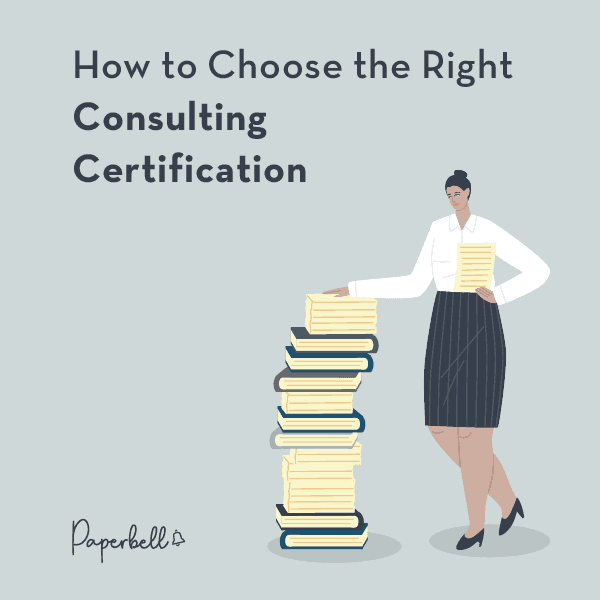To be an expert in your field, you must acquire key skills and qualifications. This is especially true in consultancy, where your clients will look to you for advice.
Hands-on experience in the business functions you consult is a great opportunity to observe the inner workings of those departments. However, learning on the job can take years (or even decades). Instead, a consulting certification can provide you with a shortcut with the tools required to step into the role of an advisor.
In this article, we’ve gathered the most important benefits of a business consultant certification, how to choose the one that fits you, and some examples you can consider, depending on your specialization.
Does a Consultant Need a Business License or Certification?
No, consultants typically don’t need a business license or certification to practice. However, requirements may vary based on industry and location, so it’s always best to familiarize yourself with local regulations.
Certain occupations require a business license to be practiced, such as counseling, law, or medicine. But unlike doctors or lawyers, consultants don’t have such legal requirements. They can offer consulting services without a license.
On the other hand, as a service provider, you do have a legal requirement to register your business.
If you’re working solo, you can become a sole proprietor, get a tax identification number, and you’re pretty much ready to start.
If you plan to expand your business and hire people at some point, you’ll need to register an LLC or limited liability company. This option will allow you to hire employees but also make your business (and not you) liable for anything that happens to your clients in legal matters.
So Do I Have To Be Certified To Run A Consultancy Business?
Being certified as a consultant isn’t a legal requirement for conducting business in this field, but it has benefits. Since anyone can technically become a consultant, it’s hard to earn your clients’ trust unless you can show proof of your qualifications.
To increase your credibility as a consultant, you can:
- Position yourself as an expert by growing your portfolio with prestigious clientele
- Gain leadership experience in the business function you advise
- Get certified as a consultant
A certification program can impress your clients and provide you with the knowledge and skills essential to excel in your job. The more consulting frameworks and strategy models you have, the more insights you can bring to the people you work with.
While industry trends might frequently become obsolete in today’s business environment, most consulting frameworks stand the test of time and have been serving consultants and their clients for decades.
The same goes for business coach certification programs—they aren’t a must for starting your own business, but they can provide essential knowledge that can contribute to your success.
Consulting Certifications vs. Consulting Courses
Certifications and courses for consultants help you advance in your professional education, but they differ in key aspects.
A consulting certification requires you to meet certain standards set by a certifying body, usually through exams that demonstrate your competence. It grants you credibility and recognition within the industry.
On the other hand, consulting courses are more about acquiring general knowledge in your field, and they don’t lead to a formal certification.
Certification programs are usually more rigorous and time-consuming, while consulting courses are more flexible and affordable.
[ Read: 36 Core Consulting Skills to Set You Apart from Your Competition ]
How to Choose a Consulting Certification?

There are plenty of certification programs you can choose from as a consultant. Here are some factors to consider:
- The size of your budget
- The amount of time you have available
- The intensity of the program and the number of months or years it takes to complete it
- The curriculum you’re specifically interested in
- Whether the reputation of the certification provider is a priority for you
If the clients you typically work with value certifications from prestigious institutions, you should invest in an internationally acclaimed program.
However, if your main goal is to widen your perspective and develop a toolkit you can rely on, you can consider lesser-known training programs instead.
Take a close look at the gaps within your methodology.
What are some common business challenges that pop up in your sessions and that you find difficult to deal with? What other business functions could you learn about to solve cross-functional issues?
These are great clues to what training you may be looking for.
7 Types of Consultant Certifications for Independent Consultants
Human Resource Consulting Certifications
A human resource consulting certification will provide an overview of all areas necessary for an HR department to function efficiently. Some of the areas you’ll learn about are:
- Hiring and talent management
- Employer branding
- Employee policies and procedures
- Salary benchmarks
- Talent development
- Human resource analysis
An online certification program at IAP (International Association of Professions) Career College costs $149. Part-time students can complete it in an average of six weeks.
No prerequisites are required, so you can sign up even if you’re just starting out and get trained on HR and consulting methodologies. The curriculum also covers how you can structure your consulting cases and present your findings most effectively.
Other institutions, such as the HRCI (Human Resource Certification Institute), have different certification programs for various experience levels.
Their learning programs focus more on hands-on knowledge in HR rather than consulting frameworks. However, they may complement other purely consulting-related training programs.
Getting certified with HRCI costs between $300-500 (plus a $100 application fee), and they require none to seven years of experience in HR, depending on what level of certification you’re going for.
To stay certified and be able to use their credentials in your portfolio, you need to retake the exam every three years.
Management and Strategy Consulting Certifications
Management consulting requires an overall understanding of all major business functions in an organization, including:
- Human Resources
- Strategic Planning
- Finance
- Operations
- Information Technology
- Marketing
It’s less important to have an in-depth knowledge of all of these areas and more crucial to be proficient in consulting processes and frameworks that can be applied in different situations.
To acquire the designation of a Certified Management Consultant (CMC®), you can search for a member institution near you on the website of ICMCI (The International Council of Management Consulting Institutes).
Requirements and costs may differ from country to country, but all certification programs of the network uphold high ethical standards. This means that they hold their members accountable for their practice’s professional, legal, social, and ecological aspects.
Apart from becoming CMC certified, you can also find plenty of specialized training options in management consulting. For example, you can become a Certified Performance Consultant (CPC) with The Training Clinic. Their program is focused on identifying and solving performance issues that impact the bottom line in organizations.
Image Consulting Certifications
As a certified image consultant, you become an expert in enhancing your clients’ appearance, behavior, communication, and digital presence on a personal and organizational level.
While brand consultants are more focused on brand strategy and the way it aligns with marketing and sales, image consulting enhances how an individual or company shows up in the world. This includes the following examples:
- Their style and etiquette
- The photography and colors they use on their platforms
- How they represent themselves overall
With AICI (Association of Image Consultants International), you can become a certified image consultant on three levels. Their program costs $310 for members and $1,490 for non-members and can be completed in six months.
Financial Consulting Certifications
Financial consultants are some of the most sought-after professionals by small businesses and large corporations. Certifications in this area vary from financial management programs with a broader overview to more specialized programs in risk management and credit consulting.
The Chartered Financial Analyst (CFA) Institute offers a comprehensive certification program that covers the ins and outs of investment analysis and portfolio management. On average, candidates spend 300 hours preparing for the three exams required to complete this program.
The Financial Risk Manager certification by the Global Association of Risk Professionals (GARP) is just as extensive. It’s recognized by most major banks and financial institutions, such as ICBC, Bank of China, and HSBC.
If you’re looking for a credit consulting certification, it’s worth considering certification providers such as:
- The National Foundation for Credit Counseling (NFCC)
- The National Association of Certified Credit Counselors (NACCC)
- The Financial Counseling Association of America
Cyber Security Consulting Certifications
Security consultants identify potential threats like information breaches in companies and optimize computer systems, networks, and software to help prevent these cyber attacks.
A security consulting certification will lead you through the processes and frameworks to review the technology standards and policies of your clients and design safer procedures for them.
You can get certified as a cyber security consultant at the International Association of Professional Security Consultants (IAPSC). The program costs $300 for non-members and $500 for members and requires three years of experience in the field.
Small Business Consulting Certifications
Small and medium-sized companies face very different challenges than big corporations. Most business consultants specialize in either one of them but rarely in both.
If you work with SMEs, accelerating organizational growth and making processes more sustainable will be central to your cases.
The Association of Accredited Small Business Consultants (AASBC) offers yearly memberships and certifications with tools to enhance performance in small businesses. The initial yearly fee is $999 which you can renew for $149. This includes their education program called SEMP Approach: Simplified Examination to Maximize Profit, as well as exam fees.
[Read: How to Become a Business Coach and Become Your Own Boss ]
Environmental Consulting Certifications
Environmental consultants need extensive knowledge of relevant regulations and the requirements for companies to comply with them. They need to acquire both scientific knowledge and technical expertise to conduct environmental assessments in organizations.
The National Registry of Environmental Professionals® (NREPSM) provides various certification options for environmental consultants and professionals. Their programs are recognized by organizations such as the US Postal Service, the US Forest Service, and the US Air Force.
How Much Does Consulting Certification Cost?
The cost of consulting certifications varies greatly. This is due to the differences in their methodologies, their reputation, and the level of expertise they offer.
Some consulting certifications (like the ones listed in this article) can be relatively affordable, ranging from a few hundred dollars to a couple of thousand dollars. These options focus on foundational skills in specific industries.
More prestigious and comprehensive consulting certifications from well-known institutions can cost several thousand dollars or more. These programs require several years of experience. On the flip side, they often provide mentorship and networking opportunities in addition to training.
If you want to learn more about becoming a business consultant and starting a practice, here’s some further reading for you:
[ Read: How to Start a Consulting Business: The 7 Key Steps (+ 5 Must-read Books!) ]
Over to You
Completing a consulting certification program can be a great investment in your long-term career success and earning potential. However, it’s not the only way to acquire the necessary knowledge and practices to progress in your field.
If you often run into gaps in your knowledge and methodology, a certification can help you fill them so you can support clients in new ways. Evaluate your career priorities and budget to help you decide the best investment for your long-term education.

Editor’s Note: This post was originally published in May 2022 and has since been updated for accuracy.









